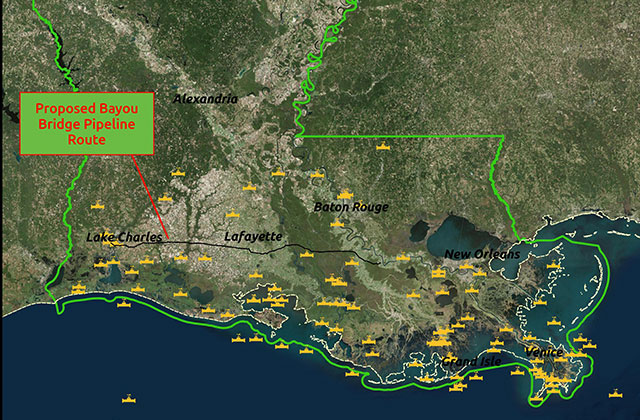A report released today (January 10) shows that nearly three pipeline accidents occurred in one week in Louisiana last year—and there were 144 total accidents in 2016. Some included leaks into the Gulf of Mexico or equipment failure near Catfish Lake.
The Louisiana Bucket Brigade, a grassroots environmental justice organization based in New Orleans, published the data using the National Response Center, in which people can report oil and chemical spills.
Corrosion, leaks, holes and ruptures caused a majority (48 percent) of the accidents, but 33 percent of them listed an unknown or unexplained cause. “There are few follow up reports and no information about if or when the problems are fixed,” according to the Louisiana Bucket Brigade.
Nearly half of the reported accidents don’t give a location name, but seven occurred in Golden Meadow, a small coastal community that subsists off its fishing and seafood industries. Baton Rouge saw three accidents in 2016. So did the unincorporated town of Venice. Spills can vary from five gallons of crude oil to more than 100 gallons of oil, according to reports filed.
The Louisiana Bucket Brigade released this report as it campaigns to halt creation of the 24-inch wide Bayou Bridge Pipeline, a project from Energy Transfer Partners, the company behind the controversial Dakota Access Pipeline. The 162-mile long pipeline is set to run from Nederland, Texas to Lake Charles, Louisiana.
"Given the gross mismanagement and terrible condition of our pipelines, there is absolutely no way that the state or the Army Corps of Engineers should permit another pipeline in Louisiana," said Anne Rolfes, founding director of the Louisiana Bucket Brigade, in a press release. "The oil industry will say that the problems aren’t so bad and minimize these accidents. The industry is like an addict–unable to even acknowledge the problem."
Fishers, landowners, students and activists are preparing to object to the pipeline during a public hearing Thursday (January 12), according to the organization. The Advertiser reports that pipeline opponents garnered enough signatures to secure the meeting, in which they hope to convince the Army Corps of Engineers to conduct an Environmental Impact Study on the pipeline—a step it initially skipped with the Dakota Access Pipeline.
